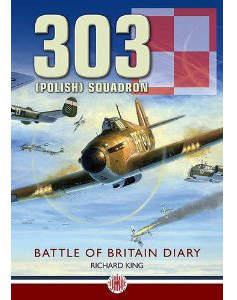

This book, besides describing the air battles of the Battle of Britain, offers biographical detail on the Polish pilots. The author, Richard King, is an Englishman with no trace of Polish ancestry. He simply became fascinated with the contributions of the Polish aviators, and decided tothoroughly research the topic and write this book.
The author notes how skeptical the British at first wereto the possibility of the arriving Poles doing a good job. They had believed German propaganda, which had insisted that the Polish Air Force had been destroyedin the first day or two of the 1939 war, and that this owed to the ineptitudeof the Polish flyers. Neither was true. Once the Poles demonstrated theirskills, there was a sea change in British attitudes. The author comments:“[Ronald] Kellet’s initial misgivings disappeared completely and he became astaunch supporter of the Poles, challenging negative comments from any source, even Churchill and Dowding. [Johnny] Kent and [Athol] Forbes were no
lessvigorous in their support…Kent would later bloody a British officer’s nose fornot standing for the Polish national anthem.” (p. 306).
The skill of the Poles owed largely to their previousexperiences in 1939 Poland and 1940 France. The Poles specialized inclose-range shooting against the Luftwaffe planes. (p. 132). Polish “kill”claims were largely and independently validated by the observations of GroupCaptain Vincent. (pp. 296-297). Far from being undisciplined as
sometimesclaimed, Polish fighters exhibited considerable discipline in breaking off theirown attacks in order to protect colleagues in battle. (p. 146).
King discusses the matter of airplane gunfire beingdirected at defenseless, baled-out pilots. (pp. 75-76). It is ironic that Germans make this accusation against Poles when, according to some Polishpilots who had survived this experience, it was none other than the Germans whowere shooting at baled-out Poles during the 1939 war.
(p. 75).
Finally, King describes an air-to-air gunnery competitionorganized by AVM Leigh-Mallory. (p. 301). The 303 (Polish) Squadron scored 808 points (sic) for 1st place, the 302 (Polish) Squadron scored 432points for 2nd place, the 315 (Polish Squadron) scored 183 pointsfor 3rd place, and the highest-scoring British and Commonwealthsquadron scored 130 points for a distant 4th place. King
comments:“Having taken a clean sweep of the first three places, could there be anybetter endorsement of their gunnery tactics or further argument as to theprowess of the Poles, and, in particular, 303 Squadron?”
The legacy of the Battle of Britain was a bitter one,with the Poles excluded from the VE parade so as not to offend the Soviets, andsaddled with a Soviet Communist puppet state thanks to the Churchill-Rooseveltbetrayal of Poland. King comments: “Looking back on the events of 1945, it isstaggering just how badly the Poles and the
Czechs were treated. Whilst thePolish contribution to all the theatres in which they had so brilliantly andgallantly served was immense, there is little doubt that their role in the Battleof Britain, coming at such a critical time, was pivotal both to the course ofthe Battle and ultimately World War Two itself.”
J-Peczkis@neiu.edu
http://www.amazon.co.uk/Polish-Squadron-Battle-Britain-Diary/dp/1906592039
